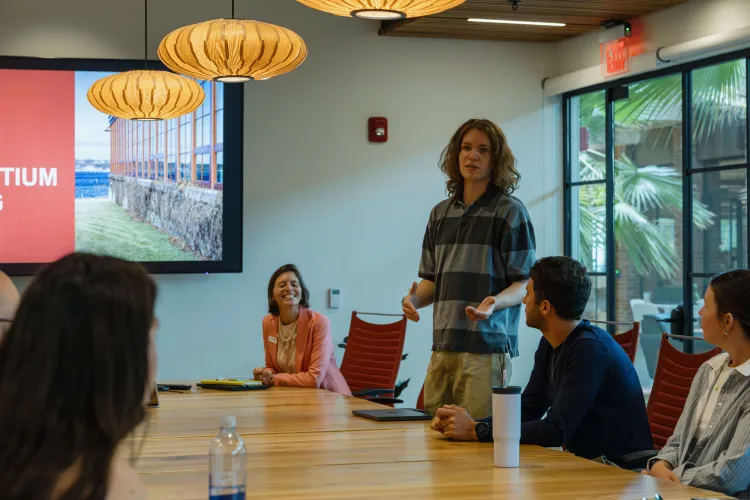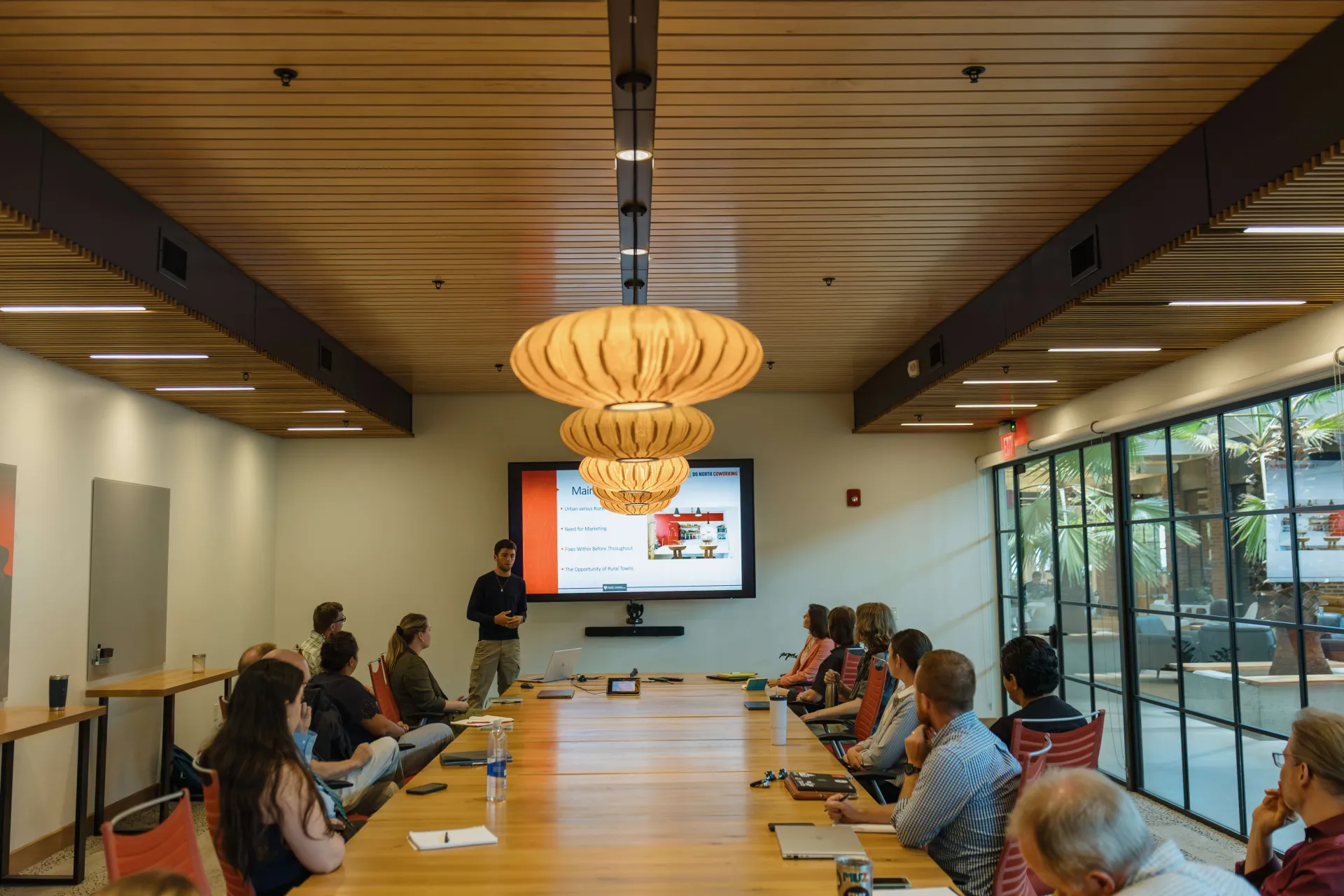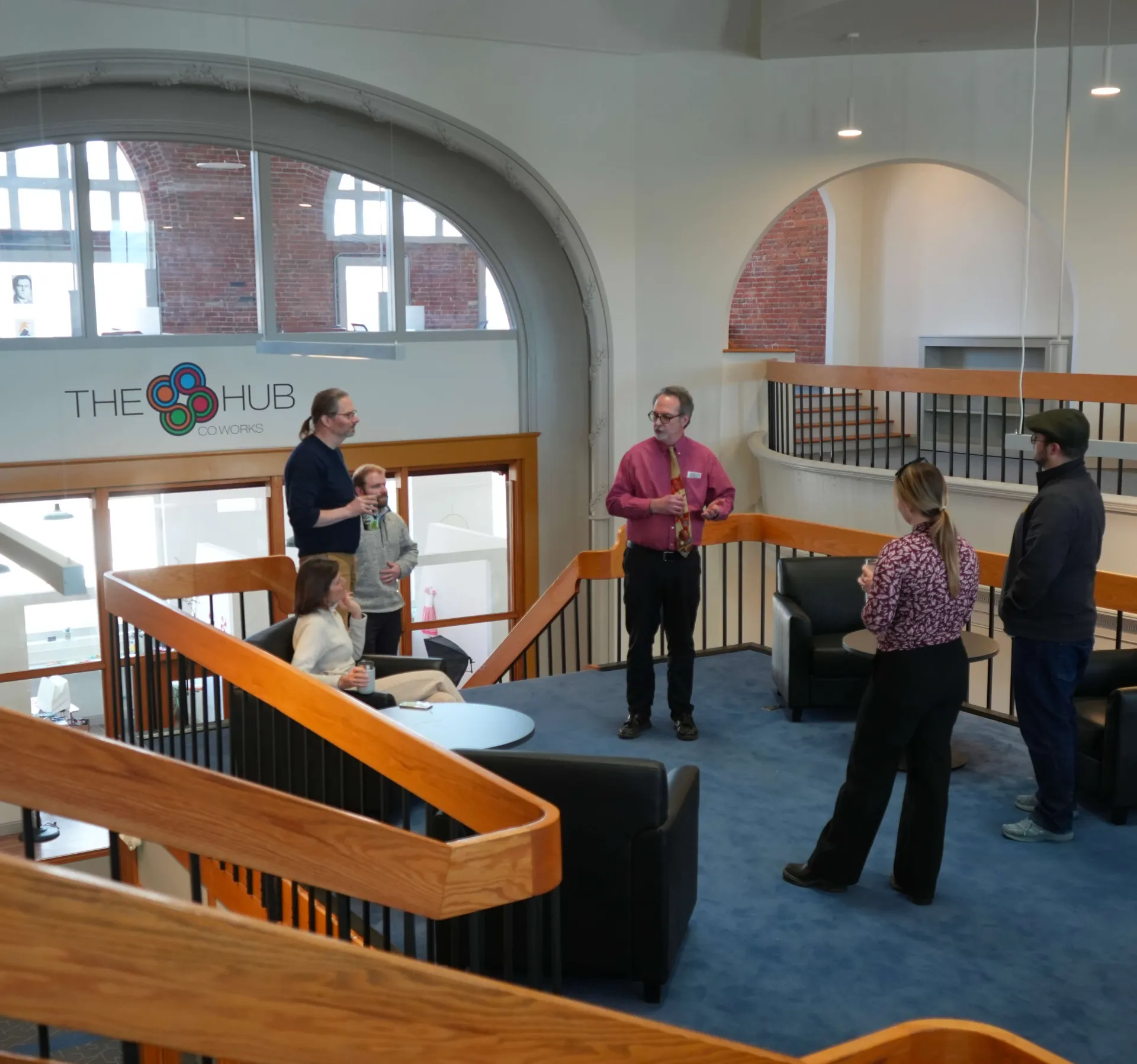“It’s really important that coworking spaces are shapable and adapt to their region’s personalities and needs...spaces need to have strong community connections” said Olivia Hatch ‘26. Hatch spent the summer interning at Black River Innovation Campus, an innovation hub/coworking space in Springfield Vermont, as a member of a research cohort of four UVM students studying rural coworking and entrepreneurship with Professor Erik Monsen of the Grossman School of Business this summer.
Coworking isn’t a new concept, but research on rural hubs in the United States is. The UVM team partnered with four diverse innovation hubs across Vermont - Black River Innovation Campus (BRIC) in Springfield, the Hub CoWorks in Rutland, Do North Coworking in Lyndonville, and Hula in Burlington – to pilot this research project. Preliminary findings show that rural coworking hubs are more than just office alternatives. They are engines for innovation, community-building, and economic resilience.
The Research
Can coworking and innovation hubs help Vermont build a more dynamic economy? Do they offer a new vision for our economic future? This research project, funded by the UVM Leahy Institute for Rural Partnerships (Leahy Institute), began collecting data on coworking/innovation hubs that could provide some answers.
The Leahy Institute funds community-engaged research aligned with UVM’s land grant mission: supporting the people, businesses, entrepreneurs, and communities across the Green Mountain State. Each student intern worked on site-specific projects in the community and contributed to the statewide research project as embedded “action-researchers” guided by Professor Monsen and Summer Colley, Economic Development Coordinator at the Leahy Institute. The students recorded daily diaries, conducted interviews (26 total), had weekly cohort meetings, and built a coworking resource library. The guiding question, according to Monsen: “How can coworking not only bring value to the people within the building, but also to the wider community?”

What they Found
BRIC (Springfield):
“The biggest challenges that hubs are facing are getting users in the space and having sustainable funding sources,” said Olivia Hatch ‘26. Hatch studied possibilities for collaboration among Vermont innovation hubs for her work with BRIC.
Vermont innovation hubs already work together to get entrepreneurs connected with the right people or accelerator programs – these informal collaborations were strengthened via quarterly meetings of the four innovation hubs organized by the project.
Hatch mapped the 23 coworking spaces across the state for BRIC, surveying individual hubs and found that each had unique offerings in their geographic regions.
Her takeaway: “Other coworking spaces are not your competitor. They are a [potential] collaborator.”
Do North Coworking (Lyndonville):
Henri Zamanian ‘27 served as a capacity-builder for Do North Coworking, building marketing plans and functioning as a third employee, while conducting research.
He asked Do North members whether they’d be interested in a reciprocity pass to work at other hubs. Zamanian found “The people in Lyndonville are there because they love it, they want to be there and want to grow [in Lyndonville.]”
Zamanian said the experience changed his perspective: “Before this, I would never have considered living in Vermont again [after graduation.] Now I see the value and community here.”
Hub CoWorks (Rutland):
Alana Bauer ’26 conducted interviews with community leaders including Rutland Mayor Mike Doenges, produced a podcast, and developed recommendations for Hub CoWorks’ events.
“Niche seminars [for entrepreneurs] are important to keep current members engaged in the community, whereas general offerings are important to keep the space accessible.”
Bauer called coworking “a catalyst for economic development.”
Hula (Burlington):
Sam Keller ‘26 launched an AI-powered “expert finder” tool and researched coworking culture at Hula during the summer. He also organized community events for over a dozen interns working at Hula businesses.
Keller found that “Physical proximity does not equal community” in a coworking space. Rather, intentional programming is necessary for community development success.
His takeaway from the research with the cohort: “There is no one size fits all approach to coworking in Vermont.”

The Future of Coworking Research
Professor Monsen presented the preliminary research on Vermont innovation hubs at the Rural Entrepreneurship Symposium at Iowa State University in July. Vermont still has big questions to answer about our economic future and a vision for rural development, and this research could start to unlock some new answers. The four innovation hubs working with UVM this summer create flexible workspaces, professional networks, and community connections that help entrepreneurs – and students - grow roots in Vermont. While more data is needed to determine the broader impact of rural hubs on Vermont businesses and communities, this work is a strong start.
“Being part of this intern cohort has shown me that young people are still passionate and driven about what we’re doing for the future,” Keller observed, during his research presentation, “Vermont has more opportunity [for us] now more than ever.”

